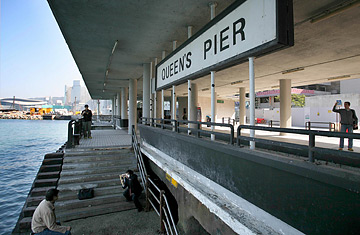
A view of the Queen's Pier in Hong Kong. The half century old landmark will be demolished to make way for a six-lane highway and a shopping centre.
Chen Yun Chung is one of about 20 activists who have been camping out in shifts on the grubby tile floor of Queen's Pier since April 26, the day after the government closed the former ceremonial port for visiting British dignitaries. Chen, who is also a professor of urban planning, and members of this loose-knit coalition of non-profit and student groups are determined to stop the Hong Kong government tearing down, or relocating the historic structure to make way for a new highway and ongoing land reclamation project that is reshaping Hong Kong's waterfront. "People feel very powerless," Chen explained. "They think the government will just do what it wants. They are very pessimistic about saving historic monuments."
Pessimistic, but nonetheless persistent. The effort to save Queen's Pier is part of a wider movement to stop the authorities from destroying Hong Kong's architectural heritage. The fate of the pier remains to be determined at a series of government meetings that could provide an answer as early as the end of May. But the activists have already won one small battle. On May 9, the Antiquities Advisory Board, the body that reviews whether buildings merit preservation, recommended saving Queen's Pier. If the Chief Executive follows the Board's lead, the pier could be on its way to being declared a monument.
Hardly a thing of beauty, the pier was designed for the official reception of British dignities that had flown in to Hong Kong's old airport, and then boarded a ferry to the heart of the city. And it hasn't hosted a British pooh-bah since shortly after midnight on July 1, 1997, when Prince Charles and Hong Kong's last British governor, Chris Patten, sailed away, having handed back the former colony to China.
Preservation activists are critical of the authorities efforts to bypass local preferences in their efforts to get rid of the pier. "Just changing hands from British governors to Beijing governors doesn't change much," says Chen. "After ten years, we thought we got rid of colonialism, but we are still here."
For many of those campaigning to save the Pier, it is a symbol of something lost. "The British took away a lot of from us, but they knew how to leave space for people," says Mary Ann King, a district counselor for the neighborhood of Wan Chai. "You'd think to yourself, at least I have freedom, if I don't have democracy."
Many members of the crowd at last Sunday's preservation rally, like the skinny guy wearing a baggy white tank top with "Power to the People" painted on the back, are too young to remember British rule, but they've nonetheless laid claim to the nostalgia. As the younger members of the crowd listen to local bands at the protest rally, King sees in the fact that they're taking action to sway the authorities as the seeds of a grassroots democracy. "Yes, universal suffrage is important," she says, "but this is more important."
At one point, a couple on vacation in Hong Kong from Shanghai wanders on to the pier and stops to read the antigovernment slogans at the tent camp, unaware of the standoff over the historic site. "For Shanghai, Hong Kong is just a business center," says the man, a 31-year-old airline employee. "Somebody told me Hong Kong is a desert of culture."
Did he agree?
"No, no," he shrugged. "It's a good place." He nodded toward the red fabric wall of protest slogans. "A person has a right to express himself. This is a democratic society — much better than in mainland China."
And as quickly as our conversation had begun, it ended. As he and his wife made a move to walk away, I asked for his name. They both looked at me and laughed.
